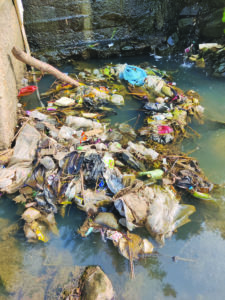SHILLONG, April 10: Since 2019, Operation Clean-Up (OCU) has become a peoples’ movement and encompasses a cross-section of organisations, individuals and school and university students.

The group has been concentrating on cleaning up the tributaries of the Umkhrah River and has focussed on the Umkaliar River. The pandemic had stalled the activity of the group in the last two years beginning March 2020 but not completely because they did have cleaning drives with social distancing and masks on. OCU has always been supported by the East Khasi Hills district administration and the Shillong Municipal Board.
Last Saturday when the OCU team comprising Team Jiva, KC Secondary School, Martin Luther Christian University (Environment Department), Meghalaya Home Guards, Col Shishupal Security Company (CSSC) and individual members arrived at the Umkaliar they were shocked to see the river reduced to a big drain. The river was loaded with garbage, from clothes to cement bags, liquor bottles, discarded vegetables, cooked rice in plastics, telephone wires and what have you.
With the help of the JCB provided by the district administration the garbage was cleared from deep inside the river bed where it had lodged against the boulders. For three hours the group slogged relentlessly. KC students led by their Headmaster, Brian Wallang, have been the most consistent group by far. Wallang and his students deep dive into the river pulling out the garbage bit by bit.
“Look guys, this river used to be clean and pristine once upon a time when we were young. Today we feel terribly disheartened to see its plight and we humans are responsible for this,” Wallang tells his students even as they work to clear the obstruction that the river encounters. The students listen attentively and ask pointed questions.
“The river is life itself. If the rivers die, we will die too because there will not be any water,” Wallang continues while the work goes on alongside. “But why do people not respect the river Sir?” ask the students. Wallang replies, “Because humans are callous and have ceased to care. Look at the people residing just next to the river. They are throwing everything into the river. We have been cleaning this river since August of 2019 but not once have they come to lend a helping hand.”
The students look very perturbed. But observers to this conversation know that deep down a chord is touched and there is hope for the Umkaliar to return to its glory someday.
For the OCU team what is disheartening is the apathy of the MLAs under whose watch this river flows its course. At least three MLAs – Charles Pyngrope, Pyniaid Sing Syiem and AL Hek – ought to have shown some concern over the plight of the Umkaliar – an important tributary of the Umkhrah. Pyngrope and Hek are aware of the movement but have not shown any inclination to lend their weight to it. Syiem was elected only in November last year, but even as MDC of the area he could not have been blind to the mound of garbage lying under the newly opened Umpling Bridge.
It is there that the lacuna in Meghalaya’s urban governance system is laid bare. There are three layers of governance – the state government, District Council and Dorbar Shnong – but all three have failed to effectively apply the law of the land which bars people from building right on the river and to release all their kitchen wastes into the river.
Further, these governance institutions have failed to stop vehicle owners from washing their cars in the middle of the River Umkaliar. In a similar manner, the River Umiew in Smit too is afflicted by a similar malady. It would appear that there is a free for all with the State Pollution Control Board either unwilling or unable to take action due to political interference.
Meanwhile the rivers of Meghalaya are either poisoned by acid mine drainage, effluents from cement factories or by being turned into sewage and garbage dumps.
The OCU plods on with the hope that “they shall overcome someday,” as the song goes and that will happen when every citizen residing next to the rivers become stakeholders in the conservation process and demand stricter laws against polluters and a more effective implementation regime.



